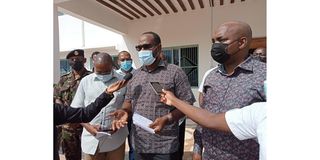More than half of Lamu households need food aid

Lamu County Deputy Governor, Abdulhakim Aboud (centre), Lamu County Commissioner, Irungu Macharia (left) and Lamu West MP Stanley Muthama (right), during a press briefing outside the county commissioner's office at Mokowe. They said over 100,000 in Lamu are in dire need of food as drought ravages the region.
At least Sh100 million is required urgently to address the effects of drought in Lamu County, the County Steering Group on Food Security has said.
About 100,000 people are facing hunger in the region.
Speaking in Mokowe when the panel released its report on Wednesday, County Commissioner Irungu Macharia said farmers’ yields were poor because the rains failed for the past one year.
Water sources have dried up and those remaining are being shared between people and wildlife.
Mr Macharia noted that almost every part of Lamu has been hurt by the ravaging drought.
The panel, which Mr Macharia chairs, brings together different stakeholders.
He said more than 50 percent of Lamu households face food and nutrition insecurity, with Lamu East the worst affected sub-county.
Lamu received 83mm of rainfall, below the long-term average (LTA) of 284mm.
This translates to 67 percent below the LTA rainfall performance recorded in the county annually.
Mr Macharia lamented that resource-based human-human and human-wildlife conflicts have been exacerbated by the drying up of water sources.
He said an influx of livestock from neighbouring counties continues in places like Mkunumbi, Pangani, Lumshi, and Dide Waride, a situation that could ignite farmer-pastoralist conflicts.
“As a county, we are in a dire situation that needs concerted efforts from all. Almost every household in Lamu has no food. We are appealing to the government, non-governmental organisations and individual well-wishers to come to the aid of Lamu people currently affected by drought, be it through relief food or cash transfers,” he said.
Lamu Deputy Governor Abdulhakim Aboud said county officials were enhancing emergency response, including water trucking, food distribution and livestock vaccinations.
He appealed to the national government and other development partners, including the Kenya Wildlife Service, to deliver water to wildlife in places like Lake Chomo and Bar’goni.
“We have sought to enhance our disaster preparedness capacity for effective emergency response now that the drought problem is recurrent in this place. Many water sources have dried up, contributing to the long trekking of animals in search of pasture,” he said.
“We’re providing water tanks, supplying water through water bowsers and drilling wells, but all in all, we need help from the central government and well-wishers to help fully address this situation.”
National Drought Management Authority (NDMA) Lamu County coordinator Mohamed Dahir said the agency would coordinate drought-related activities in line with its mandate.
“Increased livestock migration from Tana River, Garissa and other neighbouring counties has exerted pressure on pasture lands and water resources here,” he said.
“There is a severe vegetation deficit. Water pans have dried up. Lamu is in an alarming phase with severe food and water shortages. Let’s remain united to fight this.”
Lamu West MP Stanley Muthama urged groups such as the Kenya Red Cross Society to intervene and address malnutrition among schoolchildren so as to prevent absenteeism especially in drought-stricken areas.
Mr Muthama urged KWS to map out all catchment areas, especially those close to human settlements, and ensure water is supplied to wildlife.
He also urged NDMA, the Kenya Defense Forces and other organisations to help Lamu drilling shallow wells, boreholes and dams in the driest areas so as to boost availability of water for people and livestock.
“I call on relevant agencies in the national government to assist in relief food distribution and cash transfers in the hardest-hit areas to mitigate the effects of drought and Covid-19 among our people,” he said.





